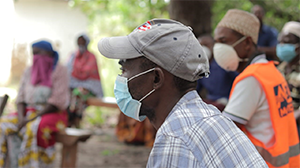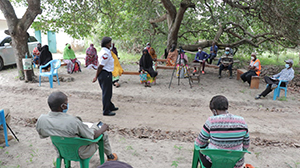Ayokunle Ogundipe
Many communities in Kwale county along Kenya's southern coast had a great thing going before the COVID-19 pandemic. Beautiful beaches guaranteed a steady stream of tourists almost year-round, but also exposed Kwale as a hotspot for the coronavirus in Kenya, with a higher than average relative rate of infection early in the pandemic. Now, in nearby mining towns and villages, already-marginalized communities living in poverty and challenging environmental conditions are at a heightened risk of contracting the virus. Most residents don't have access to televisions and radios to receive virus prevention messaging, so it is a challenge to share information about how to protect oneself and avoid spreading the virus to others. Soap and other hygiene products are not easy to come by, and most residents would opt to buy food instead of other items.
The Supporting Inclusive Resource Development in East Africa (SIRD) project (with funding from Global Affairs Canada) quickly put together a COVID response intervention strategy. In partnership with the Law Society of Kenya, the Kwale Youth and Governance Consortium and the Msambweni Youth Bunge Alliance, SIRD has set out to support the most vulnerable members of Kwale county's mining villages.

These interventions aim to reach 10 women and 10 men in 10 villages in April and May 2020 and provide them potentially life-saving information and sanitation materials.
The first "physically distanced" sensitization event in Fingirika Village took place on April 22. For the first time, residents witnessed a public health officer demonstrate proper hand-washing technique and learned about the importance of staying at home and practicing social distancing. A police gender desk officer gave tips on how to spot, curb and report gender-based violence and child abuse. The Assistant County Commissioner added some government clout – explaining that the rules and regulations for stopping the spread of the virus are not merely suggestive, and everyone has a role to play in keeping their community safe.
Chiefs, village heads and elders are usually the most accessible figures of authority. They were challenged to use their influence to help their communities by safely spreading awareness and helping with enforcement, especially by supervising the closure of social gathering hubs like bars.
Representatives of the SIRD project took the opportunity to hand out legal aid support cards that guarantee community members can access a SIRD/ Law Society of Kenya-provided pro bono lawyer if legal assistance is required during the period of the COVID restrictions and beyond. Support items were distributed to each household, including ten reusable/washable masks, 5-litre containers of hand-wash liquid soap, a 5kg bag of maize meal and feminine hygiene products.

The SIRD project has spent the last three years engaging with partners in the East Africa region, working with the Law Societies of Kenya, Uganda and Tanzania, community-based organizations, and women-led groups to increase economic growth for East Africans, especially women and vulnerable groups affected by the extractive sector. The project is responding to the COVID pandemic by ramping up support to already marginalized communities, where the quality of life has been adversely affected on account of extractive activities.
Ayokunle Ogundipe is Project Manager in CBA International Initiatives.